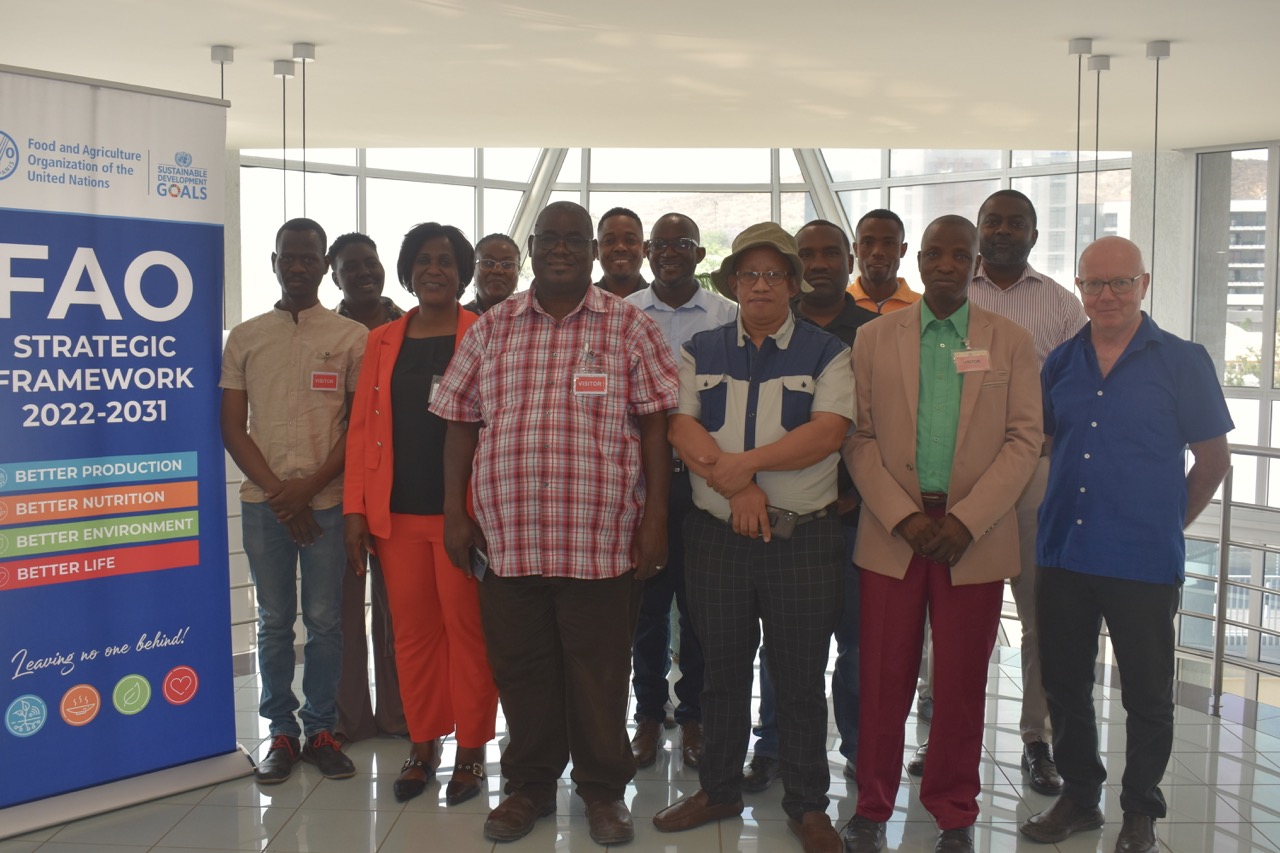FAO and the Ministry of Fisheries and Marine Resources Hold Workshop to Validate Small-Scale Fisheries Training Needs Assessment and Market Results in Namibia

The Food and Agriculture Organization of the United Nations (FAO) in partnership with the Ministry of Fisheries and Marine Resources (MFMR) held a one-day workshop on 15 October 2024 to validate the results of a Training Needs Assessment (TNA) and market assessment for Namibia’s small-scale fisheries (SSF) sub-sector.
The workshop brought together key stakeholders, including fishermen and women, fish vendors, officials from MFMR, and representatives from various communities and Small-Scale Fisheries Organizations (SSFOs), to discuss and confirm local priority training needs and design capacity-building initiatives. The goal was to address critical post-harvest challenges, particularly those affecting women, and to raise awareness about sustainable, climate-smart post-harvest techniques.
The workshop is part of a broader FAO initiative to support the implementation of the Voluntary Guidelines for Securing Sustainable Small-Scale Fisheries (SSF Guidelines), endorsed by the FAO Committee on Fisheries in 2014. Namibia is one of the beneficiary countries of the Flexible Voluntary Contribution (FVC) project titled “Implementing the Small-Scale Fisheries Guidelines for gender-equitable and climate-resilient food systems and livelihoods.” This project builds on achievements from previous efforts, including the SIDA-funded global project “Creating an enabling environment for securing sustainable small-scale fisheries.”
Identifying the gaps
The TNA and market assessment, conducted in 2024 across key regions in Namibia—Kavango East, Zambezi, Erongo, and //Karas—highlighted several critical issues faced by SSF stakeholders. Although the assessments were carried out in these four regions, participants from other regions, including Oshana, Omusati, Ohangwena, Oshikoto, and Hardap, also contributed.
Key challenges identified include high fish spoilage rates due to inadequate preservation methods, such as smoking and drying, especially during the rainy season. Stakeholders also reported significant infrastructure gaps, particularly in cold storage and transport, which limit access to broader markets and exacerbate post-harvest losses.
The assessment also underscored the vital role women play in post-harvest handling and fish processing. Despite their significant contributions, women face unique challenges, including limited access to training, resources, and market opportunities. Gender-specific training programs focused on fish processing, hygiene, value addition, and business management were identified as essential for empowering women and improving their economic standing within the fisheries value chain.
Market and governance barriers
The market analysis revealed several barriers preventing SSF Stakeholders from accessing formal markets. High transportation costs, limited cold storage, and competition from commercial fisheries were key challenges identified. Participants from regions such as Kavango East and Zambezi expressed a strong need for market linkage support and branding to increase their competitiveness in both local and international markets. The report also emphasized the importance of improving transport routes and stabilizing pricing mechanisms to facilitate market access for SSF products.
In addition to post-harvest and market challenges, the assessment identified a need for organizational and governance improvements within SSFOs. Weak governance structures hinder SSFOs from effectively advocating for their members. Training in leadership, governance, and advocacy is necessary to empower these organizations to engage policymakers and address critical issues such as illegal fishing and market barriers.
Sustaining livelihoods
Small-scale fisheries (SSF) are a crucial part of Namibia’s economy, particularly for rural communities. They provide income, food security, and employment to many families, and especially for women. Despite their importance, SSFs stakeholders face a range of challenges, especially regarding post-harvest practices and access to markets.
In his opening remarks at the workshop, Ferdinard Mwapopi, Assistant FAO Representative - Programmes, emphasized FAO's commitment to strengthening the small-scale fisheries sector in Namibia.
“FAO supports Namibia’s small-scale fisheries by promoting sustainable practices and building stakeholder capacity. Through targeted training and infrastructure development, we aim to improve livelihoods, boost market access, and empower marginalized groups, especially women, to take on leadership roles.”
Johannes Hamukwaya, Deputy Director of Aquaculture and Inland Fisheries in MFMR, highlighted the significance of the TNA in advancing Namibia’s National Plan of Action for Small-Scale Fisheries 2022-2026 (NPOA-SSF).
“This assessment is a critical step in aligning our training and capacity-building efforts with the goals of the NPOA-SSF. By addressing the identified gaps in post-harvest practices, infrastructure, and governance, we can ensure that small-scale fisheries stakeholders are better equipped to meet the challenges of an increasingly competitive market.”
Meanwhile, Ansen Ward, FAO Senior Post-Harvest Fisheries Expert, emphasized the importance of building capacity to reduce post-harvest losses and improve livelihoods.
“Small-scale fisheries are a crucial part of Namibia’s rural economy, but post-harvest losses are a significant challenge. By improving fish handling, processing techniques, and infrastructure, we can prevent these losses and ensure that fishers and processors, especially women, can generate better incomes and contribute more effectively to food security.”
Aina Petrus, Chairperson of the Namibia Women's Fisheries Network (NAMFISHNET) and a small-scale fisherwoman, highlighted the need for greater inclusion of women in training programs.
“Women play an essential role in post-harvest activities, yet they face unique challenges that often go unaddressed. Capacity-building initiatives must focus on equipping women with the skills, resources, and leadership training they need to strengthen our contribution to household food security and the broader SSF sector.”
Next steps
The results of the TNA and market assessment will inform the development of a cadre of national trainers who will be enabled to implement targeted training programs for SSF stakeholders. These programs will focus on improving fish handling, post-harvest techniques, hygiene, and value addition. In addition, infrastructure development, particularly in cold storage and transport facilities, will be prioritized to reduce post-harvest losses and improve market access.
Collaborations between local ministries, non-governmental organizations, and SSFOs will be strengthened to provide SSF stakeholders with the tools and support needed to succeed in an evolving and competitive market.
